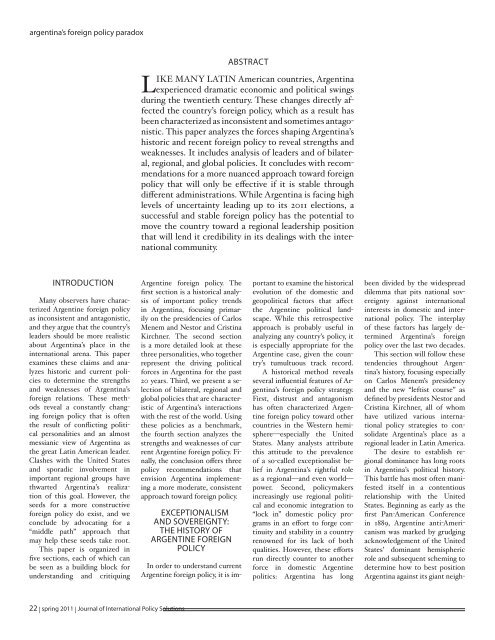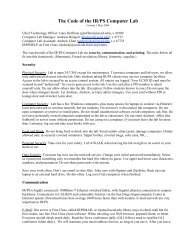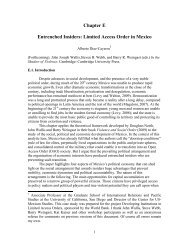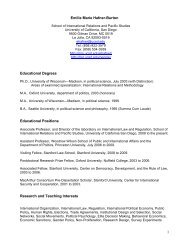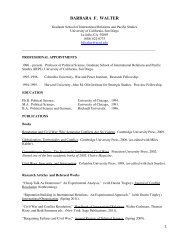to download the full journal. (1.2MB PDF) - School of International ...
to download the full journal. (1.2MB PDF) - School of International ...
to download the full journal. (1.2MB PDF) - School of International ...
Create successful ePaper yourself
Turn your PDF publications into a flip-book with our unique Google optimized e-Paper software.
argentina’s foreign policy paradox<br />
ABSTRACT<br />
LIKE MANY LATIN American countries, Argentina<br />
experienced dramatic economic and political swings<br />
during <strong>the</strong> twentieth century. These changes directly affected<br />
<strong>the</strong> country’s foreign policy, which as a result has<br />
been characterized as inconsistent and sometimes antagonistic.<br />
This paper analyzes <strong>the</strong> forces shaping Argentina’s<br />
his<strong>to</strong>ric and recent foreign policy <strong>to</strong> reveal strengths and<br />
weaknesses. It includes analysis <strong>of</strong> leaders and <strong>of</strong> bilateral,<br />
regional, and global policies. It concludes with recommendations<br />
for a more nuanced approach <strong>to</strong>ward foreign<br />
policy that will only be effective if it is stable through<br />
different administrations. While Argentina is facing high<br />
levels <strong>of</strong> uncertainty leading up <strong>to</strong> its 2011 elections, a<br />
successful and stable foreign policy has <strong>the</strong> potential <strong>to</strong><br />
move <strong>the</strong> country <strong>to</strong>ward a regional leadership position<br />
that will lend it credibility in its dealings with <strong>the</strong> international<br />
community.<br />
INTRODUCTION<br />
Many observers have characterized<br />
Argentine foreign policy<br />
as inconsistent and antagonistic,<br />
and <strong>the</strong>y argue that <strong>the</strong> country’s<br />
leaders should be more realistic<br />
about Argentina’s place in <strong>the</strong><br />
international arena. This paper<br />
examines <strong>the</strong>se claims and analyzes<br />
his<strong>to</strong>ric and current policies<br />
<strong>to</strong> determine <strong>the</strong> strengths<br />
and weaknesses <strong>of</strong> Argentina’s<br />
foreign relations. These methods<br />
reveal a constantly changing<br />
foreign policy that is <strong>of</strong>ten<br />
<strong>the</strong> result <strong>of</strong> conflicting political<br />
personalities and an almost<br />
messianic view <strong>of</strong> Argentina as<br />
<strong>the</strong> great Latin American leader.<br />
Clashes with <strong>the</strong> United States<br />
and sporadic involvement in<br />
important regional groups have<br />
thwarted Argentina’s realization<br />
<strong>of</strong> this goal. However, <strong>the</strong><br />
seeds for a more constructive<br />
foreign policy do exist, and we<br />
conclude by advocating for a<br />
“middle path” approach that<br />
may help <strong>the</strong>se seeds take root.<br />
This paper is organized in<br />
five sections, each <strong>of</strong> which can<br />
be seen as a building block for<br />
understanding and critiquing<br />
Argentine foreign policy. The<br />
first section is a his<strong>to</strong>rical analysis<br />
<strong>of</strong> important policy trends<br />
in Argentina, focusing primarily<br />
on <strong>the</strong> presidencies <strong>of</strong> Carlos<br />
Menem and Nes<strong>to</strong>r and Cristina<br />
Kirchner. The second section<br />
is a more detailed look at <strong>the</strong>se<br />
three personalities, who <strong>to</strong>ge<strong>the</strong>r<br />
represent <strong>the</strong> driving political<br />
forces in Argentina for <strong>the</strong> past<br />
20 years. Third, we present a selection<br />
<strong>of</strong> bilateral, regional and<br />
global policies that are characteristic<br />
<strong>of</strong> Argentina’s interactions<br />
with <strong>the</strong> rest <strong>of</strong> <strong>the</strong> world. Using<br />
<strong>the</strong>se policies as a benchmark,<br />
<strong>the</strong> fourth section analyzes <strong>the</strong><br />
strengths and weaknesses <strong>of</strong> current<br />
Argentine foreign policy. Finally,<br />
<strong>the</strong> conclusion <strong>of</strong>fers three<br />
policy recommendations that<br />
envision Argentina implementing<br />
a more moderate, consistent<br />
approach <strong>to</strong>ward foreign policy.<br />
EXCEPTIONALISM<br />
AND SOVEREIGNTY:<br />
THE HISTORY OF<br />
ARGENTINE FOREIGN<br />
POLICY<br />
In order <strong>to</strong> understand current<br />
Argentine foreign policy, it is important<br />
<strong>to</strong> examine <strong>the</strong> his<strong>to</strong>rical<br />
evolution <strong>of</strong> <strong>the</strong> domestic and<br />
geopolitical fac<strong>to</strong>rs that affect<br />
<strong>the</strong> Argentine political landscape.<br />
While this retrospective<br />
approach is probably useful in<br />
analyzing any country’s policy, it<br />
is especially appropriate for <strong>the</strong><br />
Argentine case, given <strong>the</strong> country’s<br />
tumultuous track record.<br />
A his<strong>to</strong>rical method reveals<br />
several influential features <strong>of</strong> Argentina’s<br />
foreign policy strategy.<br />
First, distrust and antagonism<br />
has <strong>of</strong>ten characterized Argentine<br />
foreign policy <strong>to</strong>ward o<strong>the</strong>r<br />
countries in <strong>the</strong> Western hemisphere—especially<br />
<strong>the</strong> United<br />
States. Many analysts attribute<br />
this attitude <strong>to</strong> <strong>the</strong> prevalence<br />
<strong>of</strong> a so-called exceptionalist belief<br />
in Argentina’s rightful role<br />
as a regional—and even world—<br />
power. Second, policymakers<br />
increasingly use regional political<br />
and economic integration <strong>to</strong><br />
“lock in” domestic policy programs<br />
in an effort <strong>to</strong> forge continuity<br />
and stability in a country<br />
renowned for its lack <strong>of</strong> both<br />
qualities. However, <strong>the</strong>se efforts<br />
run directly counter <strong>to</strong> ano<strong>the</strong>r<br />
force in domestic Argentine<br />
politics: Argentina has long<br />
been divided by <strong>the</strong> widespread<br />
dilemma that pits national sovereignty<br />
against international<br />
interests in domestic and international<br />
policy. The interplay<br />
<strong>of</strong> <strong>the</strong>se fac<strong>to</strong>rs has largely determined<br />
Argentina’s foreign<br />
policy over <strong>the</strong> last two decades.<br />
This section will follow <strong>the</strong>se<br />
tendencies throughout Argentina’s<br />
his<strong>to</strong>ry, focusing especially<br />
on Carlos Menem’s presidency<br />
and <strong>the</strong> new “leftist course” as<br />
defined by presidents Nes<strong>to</strong>r and<br />
Cristina Kirchner, all <strong>of</strong> whom<br />
have utilized various international<br />
policy strategies <strong>to</strong> consolidate<br />
Argentina’s place as a<br />
regional leader in Latin America.<br />
The desire <strong>to</strong> establish regional<br />
dominance has long roots<br />
in Argentina’s political his<strong>to</strong>ry.<br />
This battle has most <strong>of</strong>ten manifested<br />
itself in a contentious<br />
relationship with <strong>the</strong> United<br />
States. Beginning as early as <strong>the</strong><br />
first Pan-American Conference<br />
in 1889, Argentine anti-Americanism<br />
was marked by grudging<br />
acknowledgement <strong>of</strong> <strong>the</strong> United<br />
States’ dominant hemispheric<br />
role and subsequent scheming <strong>to</strong><br />
determine how <strong>to</strong> best position<br />
Argentina against its giant neigh-<br />
22 | spring 2011 | Journal <strong>of</strong> <strong>International</strong> Policy Solutions


